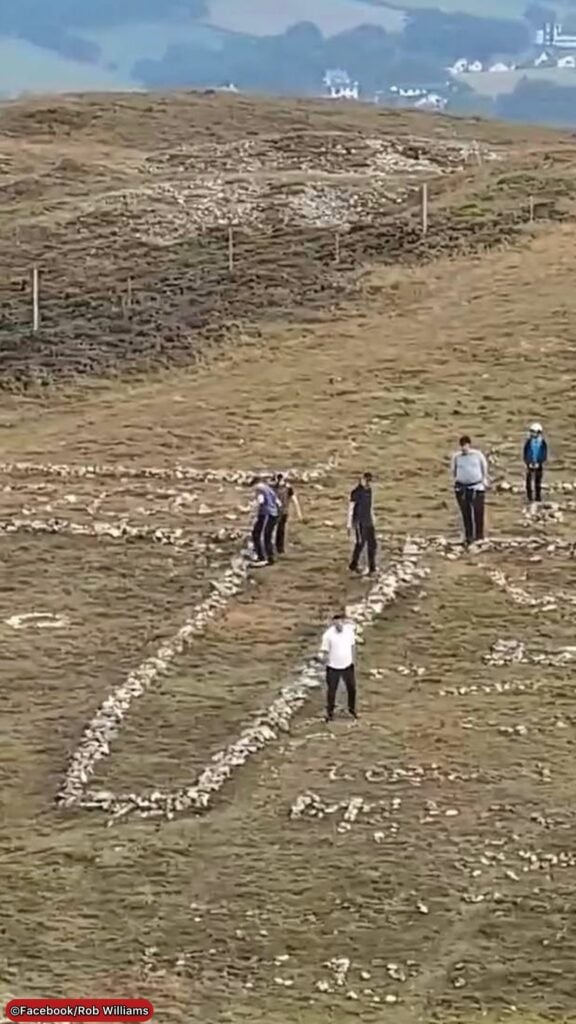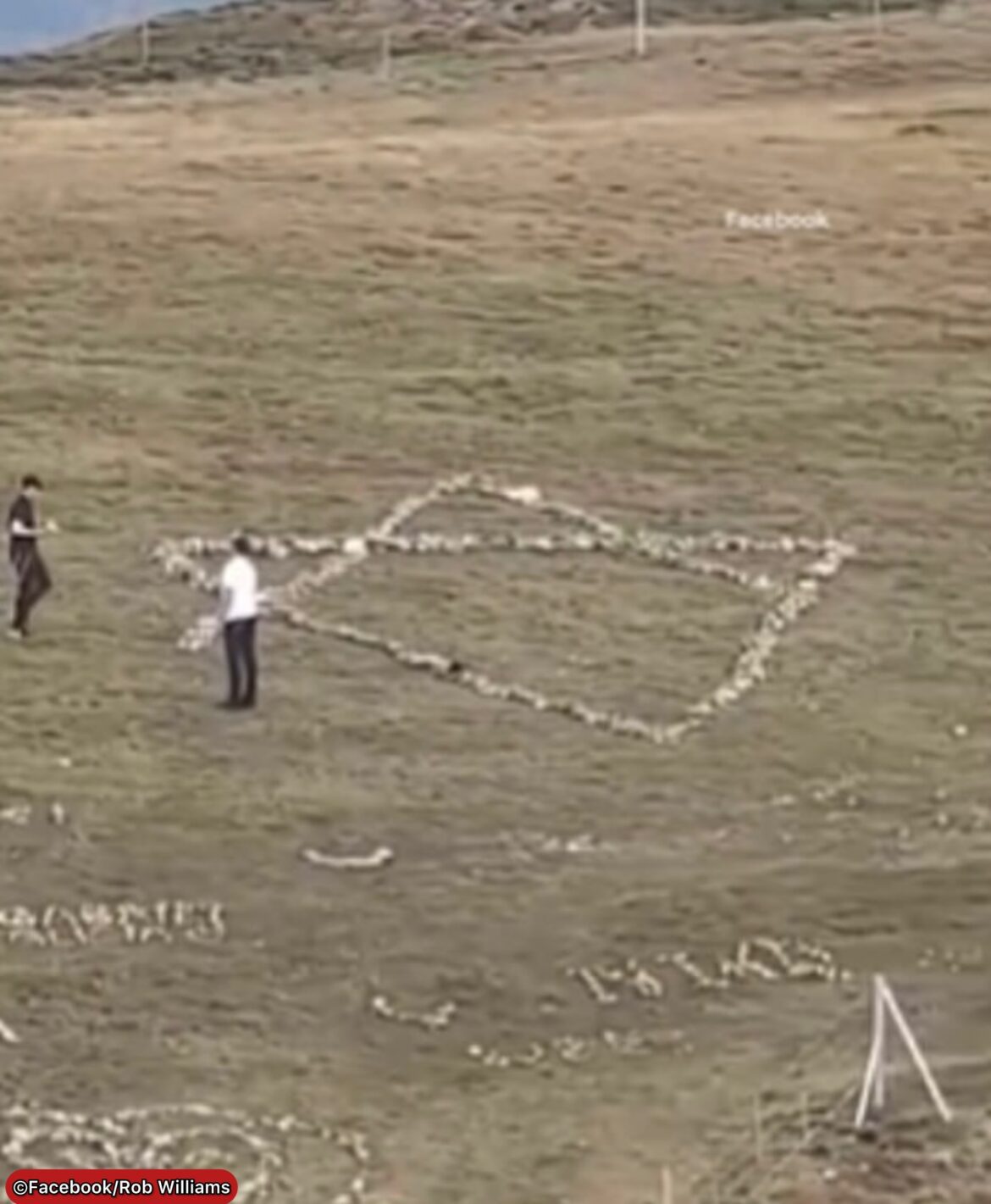Group in Orthodox dress kicks down historic landmark on Welsh hillside as locals condemn ‘disgraceful’ religious vandalism
Jewish tourists have been filmed dismantling a historic Christian cross on a popular Welsh hillside and using the stones to create a giant Star of David in its place, sparking fury among locals who condemned the “disgraceful” act of religious vandalism.
Video footage shows a group of young people, some wearing traditional kippah headcaps, kicking down stones that formed a 60ft cross which had stood on the Great Orme in Llandudno for at least 50 years. The tourists then carried the stones away to construct their own religious symbol further along the hillside.
The incident occurred last Friday on the grass hillside below the Great Orme summit, a 679ft limestone headland known locally as the “Hill of Names” where families create memorials using loose stones from a nearby quarry. The location offers panoramic views of Snowdonia, Anglesey, the Isle of Man, Blackpool and the Lake District.
In video footage seen by North Wales Live some of the group involved appeared to be in Orthodox Jewish dress. Adults who were reportedly with the party looked on without intervening as the youths systematically destroyed the Christian landmark that had become part of the landscape since the 1960s or early 1970s.
The footage, posted on a local Facebook group, shows the group working to construct a six-pointed Star of David, the widely recognised symbol of Jewish identity which appears on Israel’s flag. It remains unclear whether they completed the symbol before leaving the hilltop or how many stones were taken specifically from the cross versus found elsewhere on the stone-littered hillside.

Swift community response restores landmark
News of the vandalism spread rapidly through the seaside town, prompting immediate action from locals who rushed to restore the historic cross. Scott Puddey, who helped restore the landmark, said: “I’ve just been up the Orme and thankfully normal service has been restored. I just finished off the last couple of corners just to make sure, as someone has already cleared most of it.
By the end of the weekend, the cross had been fully reconstructed and the Star of David removed. “I helped restore the cross not for any religious purpose, just that it’s been a part of Llandudno for more than 50 years and looked after by locals and holidaymakers alike.”
The Facebook user who originally posted the video stated: “Sorry… but this cross has been on the Orme for years… show respect to any religion.” The post triggered hundreds of angry responses from residents describing the act as “shocking” and accusing those responsible of having “no respect” for the Christian landmark.
One commenter wrote: “If a Christian dismantled a Star of David to build a cross, we would be put in prison and face hate crimes!!…absolutely DISGUSTING!!!” A local man commented, saying: “I am a white British Muslim who lives happily in Llandudno and a large part of my life in Gwynedd. This is not only disrespectful but as that cross has been there a long time and has become part of the landscape.”
Academic warns against antisemitic backlash
Professor Nathan Abrams, who has worked to uncover and document stories of Jewish history and heritage in north west Wales, said: “These actions, if verified, have been committed by a tiny minority of Jews and should not be allowed to obscure the long history of Jews visiting and living in Llandudno that dates back over a hundred years.”
The professor expressed concern about the reaction on social media, adding: “However, these actions in no way justify the outpouring of anti-Semitic prejudice I have read on Facebook, and it didn’t take much to reveal the depth of prejudice bubbling beneath the surface.”
Some feared it would unfairly stir up anger and prejudice against Orthodox Jewish visitors who had been “happily visiting for well over 100 years”. Another Facebook user commented: “These people do not represent Judaism or Israel any more than football hooligans abroad represent Christianity or Britain. Have Jewish friends in Israel that would certainly have something to say about this.
Rich Jewish heritage in Llandudno
The incident has cast an unfortunate shadow over Llandudno’s long and positive relationship with Jewish visitors and residents. Llandudno owes a lot to all the Jewish families who played a huge part in the town’s development. Llandudno has recently been described as the location of the last Jewish community in North Wales.
As early as Victorian times, the commercial opportunities afforded by Llandudno’s emergence as a holiday resort attracted many Jewish merchants. The town also developed into a popular holiday destination for Jews. Over the years, the Jewish community has played a huge part in the development of the town – its economy, its culture, its political life and even its sporting achievement.
The town has hosted numerous kosher hotels and guest houses over the decades. The very first was opened in June 1872 by Joseph Aarons from Liverpool at No. 2 Neville Crescent on the promenade. Prominent Jewish businesses have included the internationally renowned H. Blairman & Son auction house, established in 1884, and the Wartski jewellers who opened shops on Mostyn Street.
Protected site faces regular challenges
The Great Orme, designated as a Site of Special Scientific Interest, has faced various forms of vandalism and unauthorised activities over the years. The limestone headland is protected for its rare geology and plant life, including scarce species that grow only in a handful of sites across Wales.
The “Hill of Names” tradition dates back centuries in the area, with families using stones from the historic Bishop’s Quarry to create messages, memorials and symbols on the grassy slopes near the summit. The Christian cross was the largest and most prominent of these designs, having stood as a landmark visible from across the town for more than half a century.
Local residents emphasised that while they welcomed visitors creating their own symbols on the hillside, destroying existing landmarks crossed a line. Another added: “I’ve got no issue with other people seeing a symbol and being inspired to add their own, but destroying one symbol to add another is such an unbelievably poor choice.
The incident comes at a sensitive time, with religious tensions heightened globally. Some locals expressed concern that the actions of what appeared to be a small group of young tourists could damage community relations that had been built over more than a century.
One person noted that Llandudno’s heritage includes many “lovely Jewish families” who “would certainly have something to say about this.” The consensus among residents was that while the vandalism was unacceptable, it should not be allowed to tarnish the reputation of the wider Jewish community or the town’s welcoming tradition.
As one resident concluded: “Glad the cross has been restored, it’s been there longer than I can remember, well done to whoever restored it.” The swift community response to restore the landmark demonstrated the local attachment to the historic symbol, regardless of individual religious beliefs.
The incident serves as a reminder of the importance of respecting local landmarks and customs when visiting historic sites, particularly those with religious or cultural significance to local communities.
Follow for more updates on Britannia Daily



